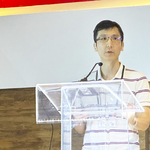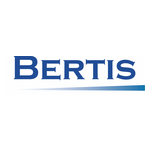- Revealed the research results of an AI-based diagnosis model that can solely determine the presence of disease with proteomic mass spectrometry data at �HUPO 2022�
- Detected the disease with over 95% accuracy in a test experiment conducted with 156 and 116 samples for ovarian and pancreatic cancer, respectively
- Bertis is currently carrying out SAN (Spectrum is All You Need) project to maximize the interpretation and utilization of proteomics data based on AI technology
SEONGNAM, South Korea--(BUSINESS WIRE)--#AI--Bertis, a proteomics-based precision medicine technology development company (CEOs Dong-young Noh, Seung-man Han), announced research results of AI-based disease diagnosis model, on December 8, 2022, at �Human Proteome Organization 2022 (HUPO 2022)�, the world�s largest academic event in the field of proteomics1. According to the results of its research, Bertis developed a diagnosis model that can determine the presence of a disease solely with proteomic mass spectrometry data by applying deep learning-based AI technology.
Bertis is working on a SAN (Spectrum is All You Need) project to overcome the limitations of existing mass spectrometry-based proteomics data interpretation and maximize its utility by machine learning. SAN is a project that aims to develop a model that can diagnose a disease solely by using the mass spectrometry spectrum of a blood sample. At the HUPO held in Cancun, Mexico, from December 4 to 8, 2022, Bertis presented the results of its first research outcome that evaluates the accuracy of the diagnostic model for ovarian and pancreatic cancer.
Bertis� deep learning model uses only the proteomic spectrum to determine the existence of ovarian and pancreatic cancer with over 95% accuracy. In this study, the research team at Bertis obtained proteomic spectra data from 156 blood samples from the ovarian cancer group (50% healthy people and 50% ovarian cancer patients) and 116 blood samples from the pancreatic cancer group (50% healthy people and 50% pancreatic cancer patients) through mass spectrometry. The team used 80% and 105 of each disease group�s sample spectra to train the deep learning model and to validate model learning, respectively. Then, remaining 10% was used to conduct a test to detect the disease.
Bertis is developing diagnostic solutions by discovering protein biomarkers of target diseases through mass spectrometry and developing algorithms. As this SAN project demonstrated the ability to diagnose target diseases only with deep learning models and proteomic spectra, Bertis plans to expedite its R&D on machine learning to present a diagnostic solution that shows better accuracy with faster identification of major diseases, including cancer.
The research result presentation was led by Eric Y. Kim, Principal Machine Learning Engineer, who previously worked as a software engineer at Google for 16 years before joining Bertis Bioscience, Bertis� US corporation, in July 2022. For the research outcomes, Mr. Kim said, �The model served as a game changer for proteomics-based diagnosis technology as it suggested the possibility of dramatical improvement in both the accuracy and efficiency of disease diagnosis by applying deep learning. We will continue to commit ourselves for further research to improve level of perfection technology and contribute to the promotion of early diagnosis of major diseases in clinical practice.�
Bertis currently possesses world-class mass spectrometry-based quantitative proteomics technology and has successfully commercialized �MastocheckTM� the world�s first proteomics-based blood test solution for early breast cancer detection. Bertis recently employed experts in the fields of bioinformatics and machine learning to conquer challenges in interpreting and utilizing proteomics data with AI and machine learning.
Sangtae Kim, Chief Technology Officer (CTO) of Bertis Bioscience said, �Although the proteome of the human body contains significant information of an actual signal of disease manifestation, currently more than half of this proteome information is discarded since it cannot be interpreted. In this situation, SAN has opened a way to maximize the interpretation and utilization of proteomic data by implementing a completely new data interpretation method based on AI technology. We will further develop this research to realize precision medicine by applying its technology in the early diagnosis of diseases, companion diagnostics, and discovery of therapeutic targets.�
About Bertis
Bertis is a company that has discovered biomarkers for cancer and other major disorders and provided diagnostic and analysis solutions based on the combination of proteomics and bioinformatics. Since our establishment in 2014, our mission has been to contribute to the health and happy life of humanity through the realization of early diagnosis medicine with a focus on the most advanced quantitative proteomics research, precision medicine based on companion diagnostic markers, and companion diagnostics for oncology drug development and personalized treatment. Our flagship solutions include MastocheckTM, the world�s first proteomics-based blood test solution for early breast cancer detection, and PASS (Pan-omics Analysis Service & Solution), a platform for integrative analysis of pan-omics (multi-omics) data. For more information, please visit our website www.bertis.com or follow us on LinkedIn (www.linkedin.com/company/bertis-inc).
MastocheckTM
MastocheckTM is a convenient technique that screens for the development of breast cancer through patented algorithmic calculations of three plasma protein levels specific to breast cancer. It can be analyzed in trace amounts of less than 1ml plasma to help diagnose stage 0-2 breast cancer, and the test showed a high sensitivity of 92% (local patent)2, even in stage 1 breast cancer, which is difficult to screen with other test methods. MastocheckTM has been patented by the Korean Intellectual Property Office since 2014, and 10 patents are currently registered in 4 countries - Korea, the United States, China and Japan3. Marketing approval was granted for MastocheckTM as an in vitro diagnostic medical device from the Ministry of Food and Drug Safety in January 20194 based on the test�s efficacy in the detection of early breast cancer and certified as New Excellent Technology (NET) by the Korea Health Industry Development Institute (KHIDI) in September 20195, 2022 Next-Generation World Class Product by the Korean Ministry of Trade, Industry and Energy (MOTIE)6. For more information, please visit the MastocheckTM website: http://www.mastocheck.com/
[1] HUPO 2022. Scientific Program. Available at https://2022.hupo.org/scientific-program-program-at-a-glance/, (Accessed on December 2, 2022)
[2] Korean Intellectual Property Office. Registered Patent 10-1431062: MULTIPLE BIOMARKER SET FOR BREAST CANCER DIAGNOSIS, METHOD OF DETECTING THE SAME, AND DIAGNOSIS KIT FOR BREAST CANCER USING ANTIBODY
[3] Ministry of Food and Drug Safety (MFDS), electronic medical device registry. Mastocheck information. Available at https://emed.mfds.go.kr/#!CECAB01F020 (accessed on September 26, 2022)
[4] Mastocheck International Patents: US (10184943, 2018), China (ZL201380013325.7, 2017), Japan (6096813, 2017)
[5] Korea Health Industry Development Institute (Khidi) Press Release, The 2nd New Health Technology Certificate award ceremony. Available at https://bit.ly/3pjUSqX (accessed on September 26, 2022)
[6] Korea World Class. guideline for selection. Available at https://www.wcp.or.kr/index/s1/s1_2.php (accessed on November 15, 2022)
Contacts
Marketing Communication
General manager
Youngsan Yun
youngsan.yun@bertis.com
Assistant manager
Yujin Jung
yujin.jung@bertis.com











